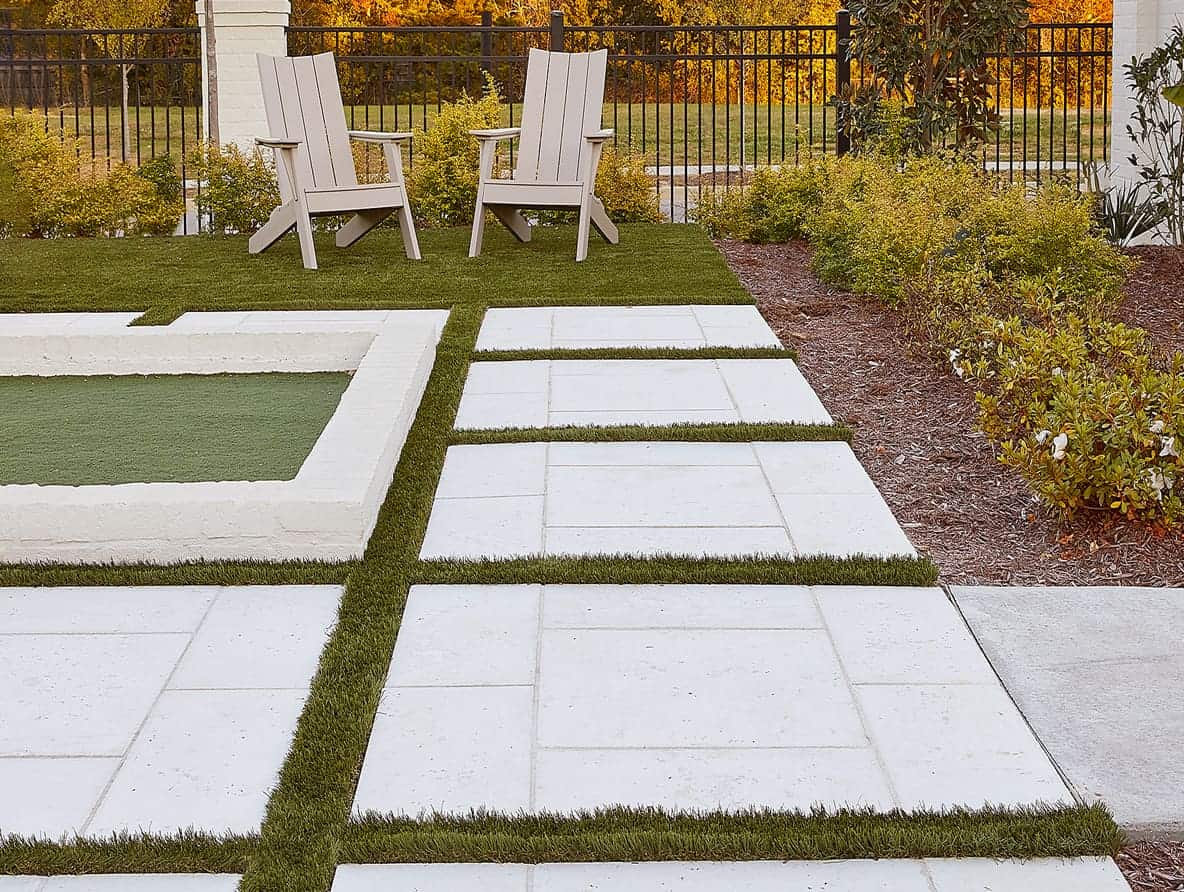If you are an architect or landscape designer looking to refresh the look for an outdoor living space, build a new pool deck, or replace an interior floor, then concrete thin pavers may provide the perfect solution for your client.
Peacock Pavers offers an array of high-quality, thin pavers that can replicate the look of natural look of ancient stone — at a fraction of the cost of natural stone, and with far less expense in excavation.
Advantages of Thin Pavers
What are some of the reasons to choose thin-set concrete pavers over other, thicker options like brick pavers, thick pavers, or poured concrete? Let’s explore five specific advantages:
1. Easy to Install over Existing Concrete
Ease of installation is one of the biggest reasons to choose thin pavers, particularly because they can be installed easily over an existing concrete slab, similar to tile. For this reason, we sometimes refer to them as overlay pavers.
Turn an existing patio into a paver patio, or replace dated linoleum or tile floors, all with minimal effort. Installing thin pavers over concrete surfaces offers an excellent way to give your clients a whole new look at an affordable price.
2. Minimal Excavation and Preparation
When installing a new walkway, pool deck, retaining wall, stepping stone walkway, or other landscaping features, the use of thick pavers or bricks requires more extensive preparation and excavation, including removing earth and preparing the paver base to allow pavers to rest flat and level. Thin pavers, on the other hand, require far less excavation and prep work. Thin pavers can rest easily over a polymeric sand base, which requires far less effort than a full excavation.
3. Fast, Easy Installation
Because thin concrete pavers require such little preparatory work, installers can complete the work in a fraction of the time when compared to thick pavers or natural stone installations. The result is lower labor costs and faster turnaround times — savings which you can then pass on to the homeowners.
4. Surprising Durability
One might assume thin pavers are more fragile and susceptible to damage than thicker paver options. However, when properly installed and protected with a sealant, thin pavers can easily hold up against wear-and-tear, the elements, and temperature extremes for many years. In fact, all concrete pavers must adhere to the American Society for Testing and Materials (ASTM) standards for withstanding freeze-thaw cycles and minimum Pounds per Square Inch (PSI) requirements, regardless of thickness. Thus, in most applications, thin pavers hold up as well for basic hardscapes as their thicker counterparts.
5. Easy Maintenance and Repairs
Just as thin pavers are easy to install (especially over existing beds or concrete slabs), they are also easy to keep in good condition. Applying sealers periodically helps them retain their color and resist the elements, and if damage does occur, thin pavers are easy to repair or replace.
Disadvantages of Thin Pavers
While thin pavers are versatile and easy to install, they are not ideal for every landscaping or remodeling project. Most notably, they are not recommended for applications that bear large weight loads, like driveways or hot tub installations. If you tried to install thin pavers over a concrete driveway, they will crack under the weight of the vehicles. For these types of projects, Peacock Pavers recommends its thicker driveway pavers.
Peacock Pavers offers a wide selection of handcrafted thin concrete pavers in various sizes and thicknesses for different applications:
- For remodels of existing interior spaces, we recommend our 5/8″ thick pavers;
- For most new construction and exterior projects, our 1″ thick pavers are a perfect solution; and
- For heavier-duty landscaping projects, try our 1 ¾” thick pavers.
We’d love to talk to you about the needs of your next architectural or design project. To learn more about the advantages of using thin pavers and for help deciding which thickness is right for you, reach out to Peacock Pavers for a quote today.
 |
| 
